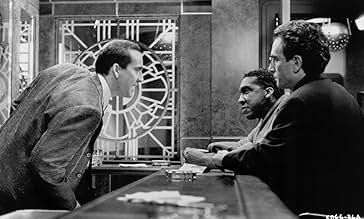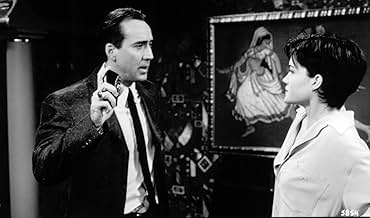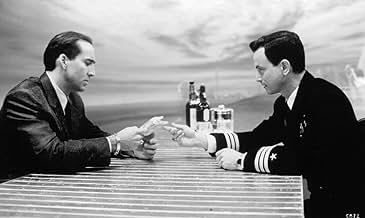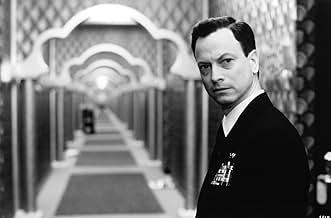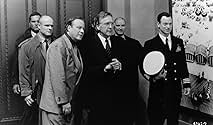Un detective de policía poco fiable se ve envuelto en una conspiración de asesinato durante un combate de boxeo en un casino de Atlantic City.Un detective de policía poco fiable se ve envuelto en una conspiración de asesinato durante un combate de boxeo en un casino de Atlantic City.Un detective de policía poco fiable se ve envuelto en una conspiración de asesinato durante un combate de boxeo en un casino de Atlantic City.
- Premios
- 1 premio ganado y 4 nominaciones en total
Luis Guzmán
- Cyrus
- (as Luis Guzman)
Opiniones destacadas
Whether you are a fan of Cage, De Palma, Sinise or pulpy vintage thrillers, "Snake Eyes" has some goodies to offer. The guys are having all kinds of good fun, going about movie's biggest flaw, a plot that wants to be grounded, suspenseful, gritty, but loses plausibility and momentum the deeper we go. If You can turn a bit of a blind eye to that, welcome to Cage's world.
Brian De Palma has made Nicolas Cage into the admirably positive minded, flamboyant, deeply flawed hero Ricky Santoro, a hotshot police detective with the amount of energy only Nic can provide. The story takes place on one night during a boxing match taking place at Atlantic City Casino, which Ricky attends together with his friend and naval officer Kevin Dunne (Gary Sinise). Little did Ricky know, a massive criminal conspiracy is about to manifest itself with the murder of an important political figure right in the middle of the fight. Ricky, naturally, decides to uncover the mystery on his own and his own way.
"Snake Eyes" start enigmatically, beautifully, with the camera spinning up a 20 minute continuous dance, making first introductions and yet unknown connections between the variety of characters we'll see later on. Straight away it's more than apparent that fans of Cage like myself are in for a treat. Overacting it may be, I don't feel privileged enough to tell given the amusing character of Ricky, but take away Nicolas from the equation and, trust me, it looks worse now. A character like Santoro fits his energetic and amusing nature. As he's flowing around and interacting with an entertaining cast of familiar faces and good performances (Carla Gugino, Luis Guzman, Stan Shaw, Kevin Dunne), solving all kinds of little, pulpy, episodic, amusing problems, the bigger, more boring conspiracy is also uncovering. When the big cat's out of the bag, which is like half-way through the film, that's where "Snake Eyes" become slower, less exciting and a lot more predictable, or in other words, disappointing. The first half is a decent pulp dime novella, and the second an uninspired chase thriller.
Multiple perceptions of a singular event, relationships between them, and the audience, is what "Snake Eyes" is mostly about, and I wonder what would've come out of it with a richer story and a less lackluster ending. De Palmas relentless visual style, paired with Cage's unique charms and the lively, saturated setting of a huge event in an arena, provides enjoyable jolts of pulpy melodrama. But when all the tricks are played, we are left with a movie too typical to ascend above others... Visually, the intro sequence is not the only impressive part, so those aspects endure, despite some other minor technical flaws (or bad ideas), like almost cartoon-like swooshing sounds during the boxing scenes.
"Snake Eyes" is not a great movie, but I do have a good amount of appreciation for it, particularly Palma's direction and, you know, Cage for the win! As a mystery/thriller of the 90's, it should please the seekers of such flicks. As for Cage fans, assemble, it will please. My rating: 6/10.
Brian De Palma has made Nicolas Cage into the admirably positive minded, flamboyant, deeply flawed hero Ricky Santoro, a hotshot police detective with the amount of energy only Nic can provide. The story takes place on one night during a boxing match taking place at Atlantic City Casino, which Ricky attends together with his friend and naval officer Kevin Dunne (Gary Sinise). Little did Ricky know, a massive criminal conspiracy is about to manifest itself with the murder of an important political figure right in the middle of the fight. Ricky, naturally, decides to uncover the mystery on his own and his own way.
"Snake Eyes" start enigmatically, beautifully, with the camera spinning up a 20 minute continuous dance, making first introductions and yet unknown connections between the variety of characters we'll see later on. Straight away it's more than apparent that fans of Cage like myself are in for a treat. Overacting it may be, I don't feel privileged enough to tell given the amusing character of Ricky, but take away Nicolas from the equation and, trust me, it looks worse now. A character like Santoro fits his energetic and amusing nature. As he's flowing around and interacting with an entertaining cast of familiar faces and good performances (Carla Gugino, Luis Guzman, Stan Shaw, Kevin Dunne), solving all kinds of little, pulpy, episodic, amusing problems, the bigger, more boring conspiracy is also uncovering. When the big cat's out of the bag, which is like half-way through the film, that's where "Snake Eyes" become slower, less exciting and a lot more predictable, or in other words, disappointing. The first half is a decent pulp dime novella, and the second an uninspired chase thriller.
Multiple perceptions of a singular event, relationships between them, and the audience, is what "Snake Eyes" is mostly about, and I wonder what would've come out of it with a richer story and a less lackluster ending. De Palmas relentless visual style, paired with Cage's unique charms and the lively, saturated setting of a huge event in an arena, provides enjoyable jolts of pulpy melodrama. But when all the tricks are played, we are left with a movie too typical to ascend above others... Visually, the intro sequence is not the only impressive part, so those aspects endure, despite some other minor technical flaws (or bad ideas), like almost cartoon-like swooshing sounds during the boxing scenes.
"Snake Eyes" is not a great movie, but I do have a good amount of appreciation for it, particularly Palma's direction and, you know, Cage for the win! As a mystery/thriller of the 90's, it should please the seekers of such flicks. As for Cage fans, assemble, it will please. My rating: 6/10.
Overblown, overdirected, overacted: that's why I always enjoy DePalma's movies. He made the statement that the camera lies 24 times a second, and SNAKE EYES plays on that theme.
De Palma's camera is constantly in motion, roaming through the arena, casino , and hotel as if it had a life of its own. At the beginning of the film we watch Nick Santoro (Nicolas Cage) as he swims through the sewer (his words) that is the Atlantic City casino world. He tells us, "This isn't a beach town. It's a sewer. It's my sewer, I am the king."
It's literally a dark and stormy night. A hurricane (a tv reporter is pressured to refer to it as a 'tropical depression' on the air) is coming ashore, and 14,000 people are gathered at a casino complex to watch a prizefight.
There's a shooting during the fight, and Cage orders the exits sealed; who would go outside into a hurricane remains a mystery, but anyhow. There are two mysterious women involved in the incident, and as time passes he realizes that there were lots of people involved, possibly even his longtime friend Navy Commander Dunne (Gary Sinese) who is as straight-arrow as Cage's character is sleazy.
By the end of the story Cage is working toward redemption- even though during the early part of the film it's made clear that he sees everything as having a price.
There's one point where he is offered a million dollars to reveal where one of the women (she knows a lot- too much- about a defense contract, and was talking to the Secretary of Defense when he was shot) is hiding. And there 's a very real chance that he might give in, or be unable to protect her when the danger gets intense.
Men in De Palma's films have a way of failing to come through for women in critical situations. An executive couldn't save his wife in OBSESSION. A young actor couldn't protect a mysterious, beautiful woman in BODY DOUBLE. The nicest guy in school couldn't keep the outcast/prom queen CARRIE from humiliation and its awful consequences. In the superb BLOW OUT a movie soundman rescues a young woman from a sinking car early in the story, but is too late to save her from a madman at the film's conclusion.
So there is no guarantee of a happy ending. Self doubt weighs heavily in De Palma's films, and often people's best efforts are to no avail.
Admittedly David Koepp and De Palma's script is something of a problem. There's a complex conspiracy underfoot, and conspiracies are low on my list of compelling things- I got burned out on them in the seventies.
Far more compelling is the great fun that Cage has with his character. Boy, does he get to chew scenery here. Constantly in motion, talking on his cell phone (even during a hurricane; some of my friends can't use theirs when a cloud passes over the sun), interacting with the low life characters around the casino.
And, oh, does DePalma have fun with the whole thing. Of course, nothing is what it seems to be. He retells the action from the viewpoint of this or that character: we sometimes literally see what happened through that character's eyes. An important setpiece in which we finally see what really happened in clear perspective uses split screen imagery- and in the theatre where we saw SNAKE EYES the use of stereo sound was an integral part of the seperation of images.
For all the bravado of his performance, I was impressed with Cage's ability and willingness to share the screen with other actors. In some of the retellings he is a supporting character or featured extra, and as an actor he's more than willing to let our attention shift to someone else. A lesser actor might have been afraid of that shift of focus. Way to go, Nicolas. That's a real sign of maturity as an actor.
So did I buy into De Palma's bag of tricks? Yup, 100%. It's nice to see a movie that isn't afraid of the old razzle-dazzle. I do appreciate subtlety and complex ideas- that's why I'm a voracious reader. I really don't think I'd enjoy De Palma directing an adaptation of a Jane Austen novel or REMEMBRANCE OF THINGS PAST. The Merchant- Ivory people do that sort of thing so nicely. But it was nice to sit back for an hour and a half and let a master showman use illusion to fool us and let our eyes fool our brains.
On a five scale, Pops gives it four slot machines.
De Palma's camera is constantly in motion, roaming through the arena, casino , and hotel as if it had a life of its own. At the beginning of the film we watch Nick Santoro (Nicolas Cage) as he swims through the sewer (his words) that is the Atlantic City casino world. He tells us, "This isn't a beach town. It's a sewer. It's my sewer, I am the king."
It's literally a dark and stormy night. A hurricane (a tv reporter is pressured to refer to it as a 'tropical depression' on the air) is coming ashore, and 14,000 people are gathered at a casino complex to watch a prizefight.
There's a shooting during the fight, and Cage orders the exits sealed; who would go outside into a hurricane remains a mystery, but anyhow. There are two mysterious women involved in the incident, and as time passes he realizes that there were lots of people involved, possibly even his longtime friend Navy Commander Dunne (Gary Sinese) who is as straight-arrow as Cage's character is sleazy.
By the end of the story Cage is working toward redemption- even though during the early part of the film it's made clear that he sees everything as having a price.
There's one point where he is offered a million dollars to reveal where one of the women (she knows a lot- too much- about a defense contract, and was talking to the Secretary of Defense when he was shot) is hiding. And there 's a very real chance that he might give in, or be unable to protect her when the danger gets intense.
Men in De Palma's films have a way of failing to come through for women in critical situations. An executive couldn't save his wife in OBSESSION. A young actor couldn't protect a mysterious, beautiful woman in BODY DOUBLE. The nicest guy in school couldn't keep the outcast/prom queen CARRIE from humiliation and its awful consequences. In the superb BLOW OUT a movie soundman rescues a young woman from a sinking car early in the story, but is too late to save her from a madman at the film's conclusion.
So there is no guarantee of a happy ending. Self doubt weighs heavily in De Palma's films, and often people's best efforts are to no avail.
Admittedly David Koepp and De Palma's script is something of a problem. There's a complex conspiracy underfoot, and conspiracies are low on my list of compelling things- I got burned out on them in the seventies.
Far more compelling is the great fun that Cage has with his character. Boy, does he get to chew scenery here. Constantly in motion, talking on his cell phone (even during a hurricane; some of my friends can't use theirs when a cloud passes over the sun), interacting with the low life characters around the casino.
And, oh, does DePalma have fun with the whole thing. Of course, nothing is what it seems to be. He retells the action from the viewpoint of this or that character: we sometimes literally see what happened through that character's eyes. An important setpiece in which we finally see what really happened in clear perspective uses split screen imagery- and in the theatre where we saw SNAKE EYES the use of stereo sound was an integral part of the seperation of images.
For all the bravado of his performance, I was impressed with Cage's ability and willingness to share the screen with other actors. In some of the retellings he is a supporting character or featured extra, and as an actor he's more than willing to let our attention shift to someone else. A lesser actor might have been afraid of that shift of focus. Way to go, Nicolas. That's a real sign of maturity as an actor.
So did I buy into De Palma's bag of tricks? Yup, 100%. It's nice to see a movie that isn't afraid of the old razzle-dazzle. I do appreciate subtlety and complex ideas- that's why I'm a voracious reader. I really don't think I'd enjoy De Palma directing an adaptation of a Jane Austen novel or REMEMBRANCE OF THINGS PAST. The Merchant- Ivory people do that sort of thing so nicely. But it was nice to sit back for an hour and a half and let a master showman use illusion to fool us and let our eyes fool our brains.
On a five scale, Pops gives it four slot machines.
This is a wonderful experience. Never mind that the acting is poor and the story weak --that was never the point. This film was made because DePalma knows how to make his camera dance and wanted to make a film based on that notion.
A central question in most art concerns the role of the viewer. This dominated easel painting, then was the center of evolution of the novel and now sits at the core of thought about film. Is the viewer an omniscient God, or can the viewer be fooled like a person? Is the viewer a passive observer, or does she `walk' with the participants as an invisible character? So many clever questions.
DePalma thinks the camera is a whole new thing, The camera is a type of character, part narrator, part actor, part god. It can lie, be fooled, search curiously, document, play jokes. So this is a film about the camera's eyes. `Snake' both because the camera can snake around following Cage, going places that Cage cannot, but also `snake' because the camera sees with forked tongue.
So we have one seemingly continuous shot of the key scene, which is played first from Cage's perspective, then the fighter's, the Navy guy, the Girl, then the cop again, and finally the `flying eye.' Along the way, every eye trick DePalma can think of is woven in:
--The girl's glasses are crushed so she sees less than the audience
--The whole mess is about what a satellite sees
--The casino has 1000 cameras which our own eyes coopt
--The thing is framed by the TV eye
--God-like, we scan over several hotel rooms while Cage and Sinese are stuck in the hallway maze
--Splitscreen simultaneity
--The whole thing is in real time, as if you were living in the action
This is masterfully intellectual. See it. Forget the story.
A central question in most art concerns the role of the viewer. This dominated easel painting, then was the center of evolution of the novel and now sits at the core of thought about film. Is the viewer an omniscient God, or can the viewer be fooled like a person? Is the viewer a passive observer, or does she `walk' with the participants as an invisible character? So many clever questions.
DePalma thinks the camera is a whole new thing, The camera is a type of character, part narrator, part actor, part god. It can lie, be fooled, search curiously, document, play jokes. So this is a film about the camera's eyes. `Snake' both because the camera can snake around following Cage, going places that Cage cannot, but also `snake' because the camera sees with forked tongue.
So we have one seemingly continuous shot of the key scene, which is played first from Cage's perspective, then the fighter's, the Navy guy, the Girl, then the cop again, and finally the `flying eye.' Along the way, every eye trick DePalma can think of is woven in:
--The girl's glasses are crushed so she sees less than the audience
--The whole mess is about what a satellite sees
--The casino has 1000 cameras which our own eyes coopt
--The thing is framed by the TV eye
--God-like, we scan over several hotel rooms while Cage and Sinese are stuck in the hallway maze
--Splitscreen simultaneity
--The whole thing is in real time, as if you were living in the action
This is masterfully intellectual. See it. Forget the story.
I love the awesome camera angles in the same take at different scenes within the movie throughout the boxing match. It feels so professional and some of the scenes are also tracking shots or long takes, but other cameras in the same scene are in close up later and with split screen editing. There's also this awesome camera angle panning as an overhead shot through apartment rooms in another sequence. The payoff of who the lead villian organizing the shootout in the audience is a little underwhelming and the ending credits linger on an outdoor location throughout for no need, but this is mostly so cool and gripping.
¿Sabías que…?
- TriviaThe opening 20 minute Steadicam sequence is not really one continuous shot - there are numerous hidden edits. At least 12 minutes of the sequence was done in one take.
- Errores(at around 26 mins) When Santoro is speaking with Lincoln Tyler in his room for the first time, Lincoln says he was head-butted and there are 2 butterfly stitches on his right eye brow. When he sends everyone out of the room you can clearly see that Lincoln now has 3 butterfly stitches on his right eyebrow while talking with Santoro.
- Citas
Commander Kevin Dunne: How's Angela?
Rick Santoro: Fat, fabulous, fantastic--I love her.
Commander Kevin Dunne: How's the other one--what's her name? Candy?
Rick Santoro: Oh, Monique? Skinny, mean, expensive--I *LOVE* her!
- Créditos curiososThe end credits scroll over a construction site scene (presumably the new casino), closing in tighter and tighter until the final shot is of a bright red jewel embedded in a concrete pillar that the workmen are installing. Most of the time the jewel is hidden under the hand of one of the workers. The ring was worn by the red-haired woman/Navy agent who was part of Commander Kevin Dunn's scheme.
- Bandas sonorasFiesta Mexicana
Written and Performed by Rick Rhodes (as Rhodes), Chieli Minucci (as Minucci) & Steve Skinner (as Skinner)
Courtesy of Zomba Music Services
Selecciones populares
Inicia sesión para calificar y agrega a la lista de videos para obtener recomendaciones personalizadas
- How long is Snake Eyes?Con tecnología de Alexa
Detalles
- Fecha de lanzamiento
- Países de origen
- Idiomas
- También se conoce como
- Snake Eyes
- Locaciones de filmación
- Montreal Forum - 2313 Saint-Catherine Street W, Montreal, Quebec, Canadá(Atlantic City Arena)
- Productoras
- Ver más créditos de la compañía en IMDbPro
Taquilla
- Presupuesto
- USD 73,000,000 (estimado)
- Total en EE. UU. y Canadá
- USD 55,591,409
- Fin de semana de estreno en EE. UU. y Canadá
- USD 16,310,373
- 9 ago 1998
- Total a nivel mundial
- USD 103,891,409
- Tiempo de ejecución
- 1h 38min(98 min)
- Color
- Mezcla de sonido
- Relación de aspecto
- 2.39 : 1
Contribuir a esta página
Sugiere una edición o agrega el contenido que falta


